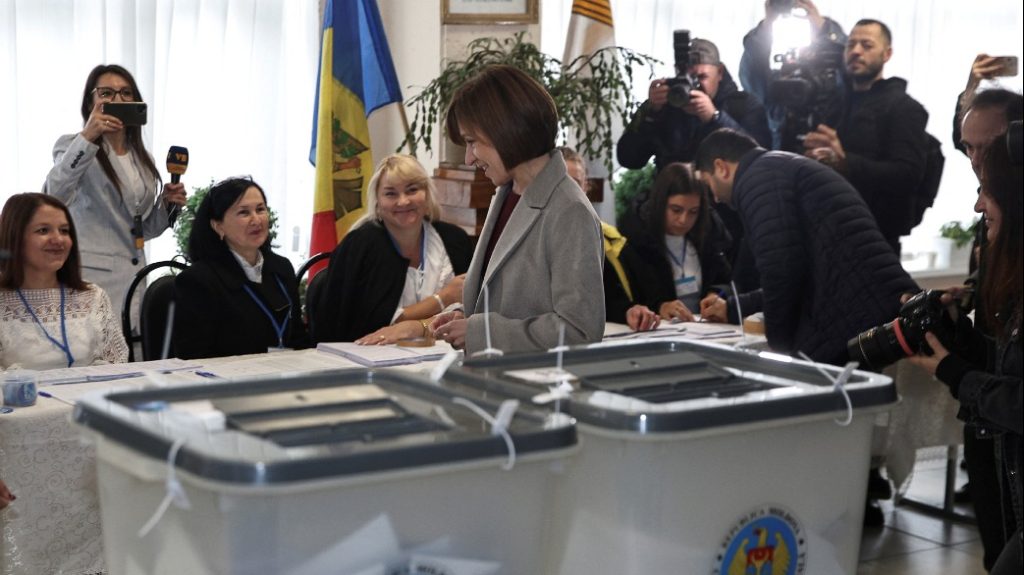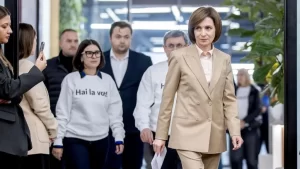
Moldovan voters have narrowly expressed their desire for the country to pursue European Union membership, with provisional results indicating a slim majority in favor. As of Monday morning, official counts show 50.08% supporting the constitutional change necessary for EU accession, while 49.92% voted against it, with over 98% of the ballots counted.
Reports suggest that many remaining votes, primarily from Moldovans living abroad, are expected to lean toward the pro-EU camp, given the diaspora’s strong support for closer ties with Europe. The unexpected closeness of the vote has surprised many, as analysts anticipated a more decisive outcome in the country of 2.6 million, located between Romania and Ukraine.
Maia Sandu, Moldova’s pro-EU president, characterized the narrow result as a consequence of foreign interference, particularly pointing fingers at Russia. She condemned the situation as an “unprecedented assault on democracy,” alluding to allegations that Moscow financially influenced voters. In recent statements, Ilan Shor, a pro-Russian businessman and politician residing in Russia, claimed he would offer money to encourage voters to choose “No” or abstain.
In addition to the EU membership referendum, Moldovans also participated in the presidential elections on the same day. Sandu emerged as the frontrunner in the first round with approximately 41% of the votes, significantly lower than anticipated, while her closest rival, Aleksandr Stoianoglo, garnered 27%. This result indicates that Sandu will face a challenging second round in early November, with the potential for her opponents to consolidate their support against her.
Sandu alleged that “criminal groups” collaborated with foreign forces to manipulate the election through financial incentives and misinformation. She asserted that her administration possesses “clear evidence” of extensive vote-buying, claiming that up to 300,000 votes were purchased—a situation she described as a “fraud of unprecedented scale.” The Kremlin has categorically denied any involvement in these allegations.

Moldova is currently engaged in EU accession talks, which are expected to continue despite the referendum’s outcome, as it was not legally binding. However, the close results have cast uncertainty over the path toward EU membership, which was initially intended to be solidified through this vote.
As Sandu failed to secure an outright majority, she will compete against Stoianoglo in a run-off election set for November 3. The election atmosphere at Sandu’s headquarters was markedly somber, with advisers acknowledging the results were not what they had hoped for. The president had campaigned vigorously for a “Yes” vote, emphasizing the referendum’s significance for Moldova’s long-term future.
When the initial results began to show a stronger-than-expected “No” vote, Sandu’s team attributed this to early counts from rural areas, while urban votes gradually narrowed the gap. Nonetheless, as the evening progressed, many began to believe that the prospects for a decisive victory for the “Yes” camp were diminishing.
Voter turnout exceeded 51%, validating the referendum, but many of Sandu’s supporters left the event disheartened. The EU flags they had brought to wave in celebration lay abandoned, reflecting the disappointment in the outcome. An adviser to Sandu speculated that the results indicated possible vote-buying efforts linked to Russian influence.
Several presidential candidates opted to boycott the referendum, including Stoianoglo, who expressed skepticism about altering the constitution but supported Moldova’s European aspirations. Despite the mixed reactions, a notable number of young voters expressed their commitment to Moldova’s European future, emphasizing the desire for economic opportunities and political stability. One voter articulated the sentiment, saying, “We need to choose a European future for our country, for our children.”
In a polling station located in the breakaway region of Transnistria, which enjoys Russian support, allegations of vote-buying were evident. A BBC producer witnessed a woman asking an election monitor about payment for her vote, highlighting concerns about electoral integrity.
Shor, the fugitive businessman, had previously promoted a “No” vote and urged citizens to support “anyone but Sandu” in the presidential elections, further complicating the political landscape in Moldova as it navigates its aspirations for EU membership amidst significant external pressures.





